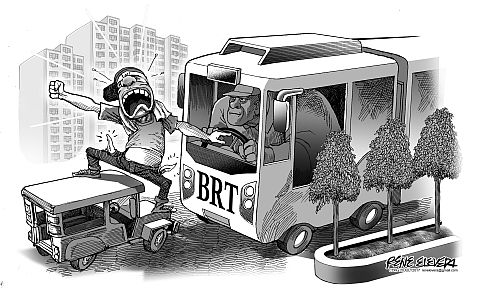
As if demanding for the repeal of the phaseout of aging jeepneys isn’t enough, jeepney drivers and operators in Metro Cebu have trained their sights on the Cebu City Bus Rapid Transit (BRT) that would sooner or later bring them into direct confrontation with the riding public.
The complaint isn’t new and in fact has been kept playing on repeat mode in the past few years: scrap the BRT and replace it with the Light Railway Transit (LRT), thus ensuring the dominance of passenger jeepneys in the city’s roads and streets to their hearts’ content.
And yet these jeepney operators and drivers have the gall to complain and denounce alternative mass transport services like Uber and Grab ever since these two ate up their market of commuters, preferring the riding public to suffer in silence as they board their aging, decrepit jeepneys to and from their destinations.
It will take quite the effort to replace the BRT with the LRT since the wheels of bureaucracy have started to churn and work on the BRT is expected to begin early next year.
To be fair though, last Monday’s transport strike by the militant transport group Pagkakaisa ng Samahan ng mga Tsuper at Opereytor Nationwide (Piston) was also joined by their chapters in other parts of the country, and some of their complaints make some sense in light of their terrain.
In Baguio City, jeepney operators had a point as recognized by the Land Transportation Franchising and Regulatory Board (LTFRB) when they said they are the most accessible, viable means of transportation for commuters traveling to and from the hinterland or mountain barangays.
But this is Cebu City or Metro Cebu, and while jeepneys will soon be limited to servicing feeder routes and kept away from the national highways or roads, they will be better suited to traveling to the hinterlands where big buses cannot travel as easily.
That is perhaps the future of passenger jeepneys not only in Cebu but in other parts of the country.
In the case of Cebu City, they will be used to transport commuters from their homes to the BRT terminals and to routes where the buses will be stationed in order not to congest traffic.
That new setup will mean a reconfiguration of the jeepney routes that will prioritize the BRT units over them.
That’s the setup the jeepney operators and drivers don’t want since it would mean cutting into their livelihood even if it would open an opportunity for the government to rationalize mass transport routes.
In essence, last Monday’s transport strike may be considered a long shot, an effort to stop the bureaucratic machinery that’s already grinding and in full motion to implement a long-gestating project that should be given a chance to succeed for the sake of Cebu City’s riding public.